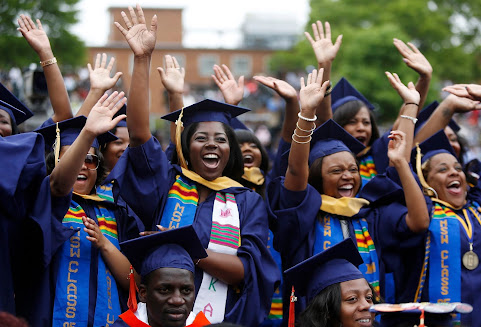Literature Review Blog #1, "Hate Crimes and Black College Student Enrollment"
The Authors:
Dominque Baker is an assistant professor of education policy
at the University of Virginia of Education and Human Development and a Vanderbilt
Peabody alumnus, and Tolani Britton is an assistant professor at the Berkley
Graduate School of Education. Both not only have extension experience in the
field of education from the stand points of students, teachers, and
researchers, but are also themselves Black women and thus have a unique and
important lens towards this topic.
Their Work:
“Hate Crimes and Black College Student Enrollment”
focuses on the effects hate crimes, both on and on campuses, have on the
student enrollment of Black Americans, especially that of new students. Baker
and Britton find that not much research has actually been done into this topic,
and thus their findings stand purely on their own merits, though they fully
acknowledge and endorse the need for more study into this area. Despite this,
they have found one surprising conclusion: that a increase of state level hate
crimes accurately predicts a significant rise in Black first time student
enrollment at Historically Black Colleges and Universities (HBCUs) (2). The
study delves into the correlation and very probable causations between the
statistics of hate crimes, Black college student enrollment at non-HBCUs, and
Black college student enrollment at HBCUs.
Key terms to pay attention to:
Historically Black Colleges and Universities
(HBCUs): Higher education institutions which were
founded for and/or by African Americans. These institutions are often safe
spaces for students of color, most notably Black students, and generally have
stronger support systems for these students.
Hate Crime(s):
in the words of Baker and Britton, “The united states Department of Justice
(DOJ) website (2020) defines a hate crime as a crime committed because of ‘race,
color, religion, national origin, sexual orientation, gender, gender identity,
or disability’” (7). This definition is of course important because, in order
to study the effects and realities of hate crimes, one must be able to know and
define exactly what a hate crime is, especially in today’s political climates.
Important Quotes:
“… little is known about how reports of hate crimes incidents
relate to the college enrollment of students of color. This lack of evidence is
especially troubling for black persons, the most frequent targets of reported
hate crimes both on and off campus… As the number of reported hate crimes is
almost assuredly an undercount of the actual number of incidents, we explore
the implications of this work while keeping that limitation in mind.” (2)
“These findings suggest that Black students seek
friendship with other Black students, particularly in settings where they
comprise a relatively small fraction of the population or feel threatened by
racism. Thus, individuals who witnessed the increase in racist rhetoric and
reported hate crimes might be more likely to seek spaces that are more racially
homophilous.” (14)
“We find that an increase in the number of reported
state-level hate crimes, regardless of the bias motivation, is associated with a
20% increase in first-time Black students enrolled in HBCUs.” (35)
“It is important to understand the ways in which an
increase in macro-level intolerance and oppression is related to institutional
enrollment decisions as a first step to higher education institutions working
to actively create welcoming campus environments where all students can thrive
while feeling safe.” (36)
Citation:
Baker, Dominique J; Britton, Britton.
“Hate Crimes and Black College Student Enrollment.” Center for Education Policy
Analysis, 6 Jan. 2021, cepa.stanford.edu/content/hate-crimes-and-black-college-student-enrollment.

Comments
Post a Comment